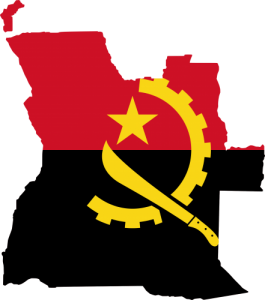By Sarah-Claire Jordan
 For those who don’t know, Angola is an African country located on the Atlantic coast in the south. It shares a border with Namibia, Zambia, and the Democratic Republic of the Congo and is among the largest countries in Africa. The seeds of colonization of Angola by the Portuguese were planted in the 1500s, with trading posts and small settlements along the coast. By the 1800s, Portuguese immigrants, among other European immigrants, began making their way to the country to start new lives.
For those who don’t know, Angola is an African country located on the Atlantic coast in the south. It shares a border with Namibia, Zambia, and the Democratic Republic of the Congo and is among the largest countries in Africa. The seeds of colonization of Angola by the Portuguese were planted in the 1500s, with trading posts and small settlements along the coast. By the 1800s, Portuguese immigrants, among other European immigrants, began making their way to the country to start new lives.
Angola did not become independent from Portugal until 1975. Though it was under Portuguese rule for such a long time, some of the native languages of the land did survive. Here you can take a look at a few of the most important languages spoken in Angola:
1. Angolan Portuguese
Having been a Portuguese colony for so long, it’s only natural that Portuguese would end up being the official language of Angola. However, just like other African countries where Portuguese is spoken, there is some variation in how it is spoken. From the beginning, however, it was seen as very important to speak Portuguese as accurately as possible, and so Standard European Portuguese is the preferred dialect. There are some phonological differences between Angolan Portuguese and European Portuguese, but not as many as there are between Brazilian Portuguese and European Portuguese. There are, however, some words that are only used in Angolan Portuguese.
2. Umbundu
There are many languages of the Bantu language group spoken in Angola, but Umbundu is the one with the most speakers. About one third of the population of Angola are native Umbundu speakers, known as “Ovimbundu”. Umbundu is mostly spoken in the Central Highlands of Angola, and also along the coast of those same highlands. It is known for having three different tones: low, downstepped high, and high. You can see these tones in words by looking for different accent marks. The first acute (á) accent of a word is the high tone, any acute accents after that one are downstepped high tones, and the accent grave (á) represents the low tone. If a syllable doesn’t have an accent marking, then it has the same tone as the syllable before it.
3. Khwe
Khwe is a language that belongs to the Khoe language family, and is a dialect continuum as well. That means that there are a group of dialects that exist on a spectrum, with those next to each other being very similar and those on either end of the spectrum being very different, sometimes even mutually unintelligible. There may not be very many speakers of Khwe in Angola compared to before Angola became an independent country. This is because the Portuguese used Kxoe, one of the ethnic groups that speaks Khwe, as trackers, which generated anti-Kxoe sentiment among the rest of the population of Angola. Those who may have fled are returning now in small numbers, so we may see an increase in Khwe speakers in Angola.
For an overview of our translation expertise, visit our technical translation service page.



